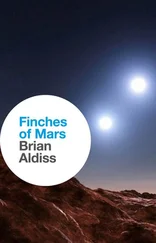Brian Aldiss - White Mars
Здесь есть возможность читать онлайн «Brian Aldiss - White Mars» весь текст электронной книги совершенно бесплатно (целиком полную версию без сокращений). В некоторых случаях можно слушать аудио, скачать через торрент в формате fb2 и присутствует краткое содержание. Год выпуска: 1999, ISBN: 1999, Издательство: Little, Brown UK, Жанр: Фантастика и фэнтези, на английском языке. Описание произведения, (предисловие) а так же отзывы посетителей доступны на портале библиотеки ЛибКат.
- Название:White Mars
- Автор:
- Издательство:Little, Brown UK
- Жанр:
- Год:1999
- ISBN:0-316-85243-0
- Рейтинг книги:5 / 5. Голосов: 1
-
Избранное:Добавить в избранное
- Отзывы:
-
Ваша оценка:
- 100
- 1
- 2
- 3
- 4
- 5
White Mars: краткое содержание, описание и аннотация
Предлагаем к чтению аннотацию, описание, краткое содержание или предисловие (зависит от того, что написал сам автор книги «White Mars»). Если вы не нашли необходимую информацию о книге — напишите в комментариях, мы постараемся отыскать её.
White Mars — читать онлайн бесплатно полную книгу (весь текст) целиком
Ниже представлен текст книги, разбитый по страницам. Система сохранения места последней прочитанной страницы, позволяет с удобством читать онлайн бесплатно книгу «White Mars», без необходимости каждый раз заново искать на чём Вы остановились. Поставьте закладку, и сможете в любой момент перейти на страницу, на которой закончили чтение.
Интервал:
Закладка:
Alpha sat contentedly for hours, watching. Her particular admiration was for the way in which the squid changed body colour as they glided through the coloured passageways.
We were there one day—I was chatting to some other mothers—when in came Peters with a dark-skinned man I did not know, together with the famous Paula Gallin.
She scooped up Alpha, who knew her well, and kissed her passionately, calling endearments and making Alpha give her beautiful chuckle. The two men, meanwhile, were putting a cassette into a player at the rear of the bar.
Then Paula demanded the attention of the cafe’s clientele.
“I just want you all to take a look at a piece of film. A sneak preview of my next production, okay? It won’t take a minute. Okay, guys.”
The mirror behind the bar opaqued and there were figures moving and talking. They were in a long hall, filmed in longshot. All was movement. A man and a woman were talking in the crowd, talking and quarrelling. In the main, they avoided each other’s gaze, shooting angry glances now and then. As they continued walking but their voices grew louder, the crowd about them froze into immobility.
The man said, “Look, all I do I do for you.”
“You don’t. You do it for yourself,” said the woman.
“You’re the selfish one. Why are you always attacking me?”
“I don’t attack you, you liar. I was just asking you why—”
“You were distinctly interrogating me,” he said, breaking into her sentence. “You’re always on at me.”
“I simply had a small suggestion to make, but you would not listen. You never listen.”
“I’ve already heard what you have to say.” He was red in the face now.
“I do everything for you. What do you do for me?”
His manner changed entirely. “I do nothing for you, do I?” He appeared completely crestfallen. The woman turned her head angrily away.
The film cut, the mirror returned.
Paula laughed with a rich kind of gurgle. “Okay, folks, now which of those two characters do you think was in the wrong, or was most wrong?”
We gave our opinions, the few of us sitting in the cafe. Some thought the man was feeling guilty about a misdemeanour. Others thought the woman was a nagger. Most of the speakers took sides. I said that they had got themselves into the kind of situation where both parties were wrong; they needed to stop quarrelling and try to find agreement, if necessary calling in a third party.
“Gee, you’re an enlightened bunch,” said Paula, joshingly. “Now tell me what you make of the woman’s last remark, ‘I do everything for you; what do you do for me?’”
So we chewed it over, we cafe-goers, while Paula cooed over Alpha. We were more or less in agreement that the woman’s statement was destructive in itself. We disagreed about whether it was made more awful by being the truth or a vicious lie. Nor could we agree about the man’s response: was it a sullen repudiation of her remark or a wretched admission of the truth?
“That’s enough,” Paula said, sharply. “Thanks. Bevis, Vance…”
What we did not realise was that the mirror behind the bar was a two-way mirror. Later, we saw an edited version of ourselves in Paula’s new filmplay, Mine? Theirs? Since we never knew what the filmed pair were quarrelling about, our judgements seemed facile. It was one of Paula’s rather unpleasant tricks.
Perhaps that habit of hers caused the tragedy that was to follow—a tragedy that for a while eclipsed our preoccupation with Chimborazo.
Paula had a beautiful and strong face with marked features—a forceful jaw, in particular, and a beaky nose; her features were very unlike my rather ambiguous ones. Although she often took and discarded lovers, her real interests, or so it seemed to me, were directed elsewhere. Her predatory and creative mind wished to ingest the experiences of other people, and by so doing widen her own dimensions. Perhaps she had a driving need to resolve her own tensions.
Her clothes were designed by Bevis Paskin Peters. She rejected the customary unisex Now overalls, so Peters became the planet’s first popular costume designer. He evolved a classical line imaginatively in keeping with the shortage of materials. The other man in Paula’s ménage a trios was called Vance Aylsha. He was a technician and rather a genius, according to report. He also looked after the little cephalopods in the cafe aquarium.
At times Paula could be large and florid. At other periods she appeared smaller, perhaps when she was actually working in her studio and unconscious of her own persona. I cannot say I liked her much. She was bigger than I, and unpredictable.
Nevertheless I was quite frequently in her company because she adored—or at least was fascinated by the growth experience of—Alpha. She would cease her work, towards which she was otherwise obsessive, to play for two hours at a stretch with Alpha. There was nothing Alpha liked better.
Nor was there much I liked better than to see these two intellects, the mature and the awakening, meeting in quizzes and tricks and mock deceptions and sheer nonsenses. I was aware of the antiquity of these games and that awareness added to my happiness.
How starkly the lovely energies of the three of us, the warmth of our bodies, contrasted with the frozen world outside, making it more thrilling to be there!
It was not all plain sailing; with such an outgoing character, arguments were always springing up. I had made some remark in praise of Tom Jefferies, whereupon Paula said, cuttingly, “You should stay away from that creep.”
When I protested that Tom was a courageous and altruistic man, Paula gave this reply.
“Not at all. He’s a creep. Of course he loves his plan. He wants us all to conform to it. He wants us all to be better people. That’s because he doesn’t like us much. Maybe he’s scared of us—no, not of you, Cang Hai, but you’re another sexless little thing, aren’t you?”
“I’m certainly not sexless. Nor is Tom.”
“But you don’t have sex, do you?” She laughed. “You need awakening. Come to bed with me and I’ll show you what you’re missing.”
Although I did not take up her offer, it was from lack of courage rather than from virtue. I saw why her two current men lusted for her.
I saw how her interest, as expressed in her plays, was in people rather than theories of behaviour. She liked chaos. It answered a dangerous element in her make-up.
At the time of which I am speaking, Paula Gallin was working on Mine? Theirs? She spent her days cutting, editing, morphing, swearing. I was witness to her outbreaks of anger against her male friends, whom she found necessary even as they broke her concentration. Creativity was by now better understood and better respected, but I went to the Ambient stand to look at the words of an old savant, Doctor Storr, whose work on the dynamics of creation remained of value.
Doctor Storr says that a child who has a parent who ill treats him but on whom he is nevertheless dependent will regularly deny the “bad” aspects of the parent and repress his own hatred, perhaps by developing some symptom such as nail-biting or hair-pulling. These activities show the displacement of repressed aggression and its turning against the self.
“It seems likely, however,” the doctor continues, “that there is another way of dealing with incompatibles and opposites within the mind, provided one is sufficiently robust to stand the tension; and this is the way adopted by creative people. One characteristic of creative people is just this ability to tolerate dissonance. They see problems that others do not see; and do not attempt to deny their existence. Ultimately the problem may be solved, and a new whole made out of what was previously incompatible, but it is the creative person’s tolerance of the discomfort of dissonance that makes the new solution possible.
Читать дальшеИнтервал:
Закладка:
Похожие книги на «White Mars»
Представляем Вашему вниманию похожие книги на «White Mars» списком для выбора. Мы отобрали схожую по названию и смыслу литературу в надежде предоставить читателям больше вариантов отыскать новые, интересные, ещё непрочитанные произведения.
Обсуждение, отзывы о книге «White Mars» и просто собственные мнения читателей. Оставьте ваши комментарии, напишите, что Вы думаете о произведении, его смысле или главных героях. Укажите что конкретно понравилось, а что нет, и почему Вы так считаете.










